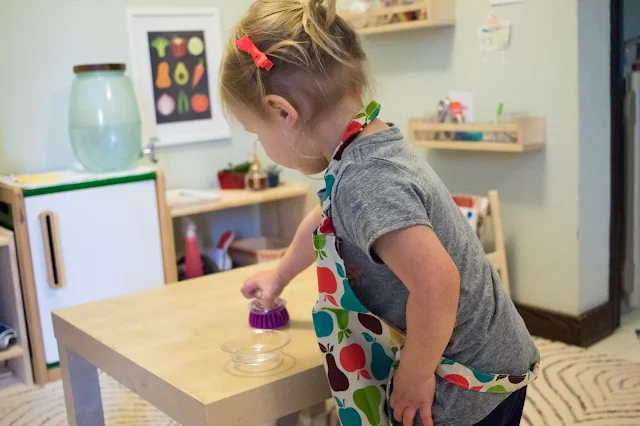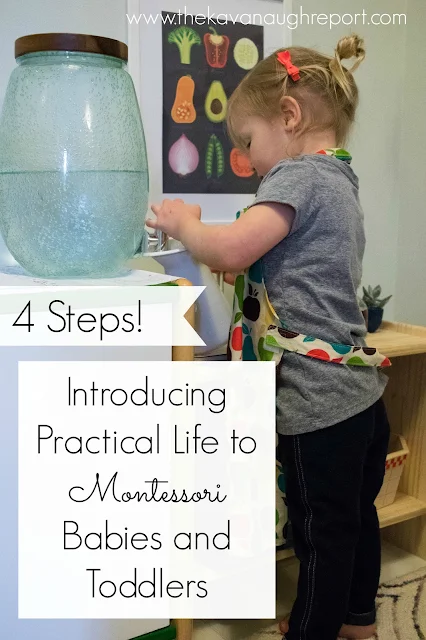April 11, 2017
Introducing Practical Life to Montessori Babies and Toddlers
Tagged in:
12 Months to Montessori,
Montessori,
Montessori Baby,
Montessori Toddler,
Practical Life,
Doing practical activities is such an important part of Montessori -- both at home and in a classroom. An emphasis is placed on practical life because learning these types of skills is not only attractive to kids but it's an important step on the road to independence.
However, it can feel a little overwhelming to start to give babies {yes, babies!} and toddlers this type of independence. So, here are four steps to consider when introducing practical life to Montessori babies and toddlers.
Make it Practical
First, you have to make it practical! I mean really practical. I'm not talking sensory bins here. And, I'm not talking about the small work trays that isolate one type of motion. Practical is folding real laundry, it's getting themselves a drink, it's helping to cook a meal, it's cleaning a real mess, and it's caring for a real plant. There's are so many amazing ways that both babies and toddlers can get involved. These exact tasks will vary based on your child's age and interests.
Nora washes her hands at our children's Montessori kitchen.
Now, a note on those little trays. Those are typically found in a 3-6 classroom. Toddlers tend to get messy or lose interest quickly with these because they are not interested in refining their motions in the same way an older child is. But, this doesn't mean I've never used them! On occasion Nora has gotten very interested in a particular skill, and I will bring something out for her. But, it's not the main way she is introduced to practical skills like pouring, scooping, tweezing, or transferring.
Prepare the Environment
Next, you have to prepare the environment for practical success. Your child is not going to be able to get their own drink if the cups are on a high shelf. He won't be able to clean up a spill if there are no towels. She won't be able to care for a house plant if there are no plants. We, as the adult, need to make some changes so the child has a place in our house.
Does this mean we need child-sized everything? No! But, it may mean going room by room and really thinking about how your children can really access the space. It's not unusual for me, for example, to go into a room and sit down or crawl around to see what my children see. It sometimes makes me realize that it takes four motions to get a towel in this space, when if I moved the towels {or one towel} to a lower shelf it would only take one.
Pouring a drink.
This also sometimes means having the right tools. Now, this doesn't always mean fancy, expensive Montessori tools, but it does sometimes mean needing child sized equipment. In the kitchen, for example, child sized tools can be extremely important. But, for cleaning, for example, regular adult tools can often be adapted for this purpose.
Break it Down
Third, break down the steps! You don't have to show your baby every part of the table washing exercise from day 1! Start with handing your baby a wet cloth as you wipe down the table with him. Then, one day you notice he is starting to wipe. Or pour your baby's drink in front of her and then one day, she's reaching to pour herself.
So, to do this, I literally sit down and think about all the steps involved in whatever practical life activity, I've noticed that Nora is interested in. Then, I start with the absolute smallest thing she has to do first in order to complete the activity. And, I make sure she knows how to independently take that step. If she doesn't that's what I will focus on with her before moving to more freedom. Depending on the task, these steps may look different. It may be focusing on grabbing and walking with a cup, it may that you are working on learning to pour from a pitcher, or learning to fold a shirt. It's all these little practical activities that eventually encompass an entire sequence of work.
A child sized apron.
Let's use hand washing for example. {These steps may vary based on your own set up} The very first thing she has to do is grab her pitcher and walk it over to our water source. Does she know where the pitcher is? Can she reach it? Does she know how to grab and walk with the pitcher? Then, once she gets to our water source, does she know how to turn it on? Does she know how to turn it off? Does she know when to stop filling? Then, she has to walk back to our sink, does she know how to pour the water out? Does she know where the pitcher goes when she's done? Does she know where to get the soap?
And, I go on and on like this until the task is completed. If the answer is yes, then I keep moving on until I get to a no. When I get to a "no" then I know that's one area where I need to focus with her. Or show her again {or on occasion make a work specifically focusing on this skill.} As we start doing these tasks together {once she masters she does them alone} every "yes" answer I am trying for her to take that step without my help or intervention. Then when we get to a "no" I'm either doing the task or showing her.
How much you need to break down a task is really going to depend on your child. A baby will obviously have a lot more "no" answers than a toddler. So, an older child may be able to handle a lot more from the beginning, where a baby may just have glimpses of these activities for a long time! Follow your child!
Stop Asking
Finally, rephrase how you are framing practical activities. Stop asking "can you" or "will you..." With toddlers and babies this often invites a power struggle. Instead, use observational statements "I see that the plant needs to be watered." Leave it at that. I bet you'll be surprised how often that prompts your toddler to go water that plant. And, if it doesn't, OK. Then, just do it yourself without making it a big deal. "I see that you need a water cup." "I see that the dog has no food." Whatever it may be.
Watering a plant.
Then, if you are doing some practical work, invite your toddler instead of directly asking. Instead of saying "can you fold laundry with me?" you can say "I'm folding laundry, you're welcome to help." Again, it's a simple change but it's often very effective at avoiding a power struggle or resistance from a newly independent toddler.
Practical life with babies and toddlers is not a race, and it's not a way to keep your child busy. It's just a way to give independence, and allow your very capable child become an active contributor to your family. And, they absolutely love it!
12 Months of Montessori
This post was brought to you as part of the 12 Months of Montessori series. Don't miss these other Montessori and Montessori inspired posts on practical life from these wonderful bloggers.
Montessori Practical Life Ideas for the Spring (free printable) | Natural Beach Living
The Best Way to Sew on a Button {for kids} | The Natural Homeschool
How to: Montessori Indoor- or Small-Space Gardening in a DIY Sensory Table | Living Montessori Now
Montessori Inspired Tools and Toys for Building | Mama’s Happy Hive
Introducing Practical Life with Montessori Babies and Toddlers | The Kavanaugh Report
Introducing Email for Elementary Practical Life | Grace and Green Pastures
Practical, practical life activities at 4 years old| Welcome to Mommyhood













